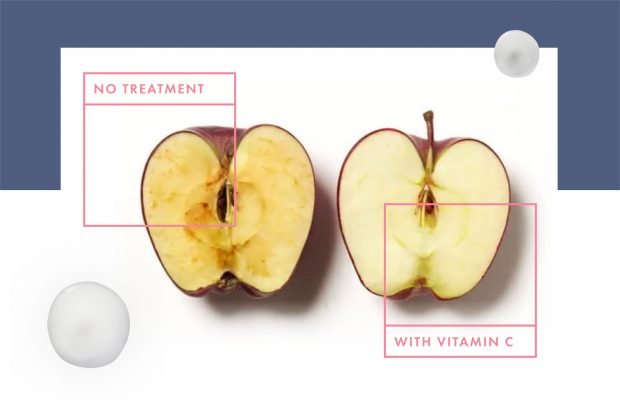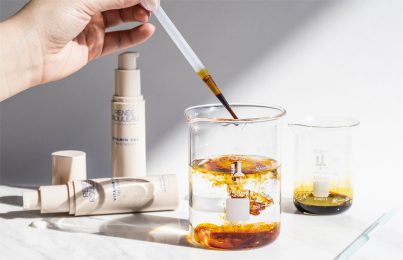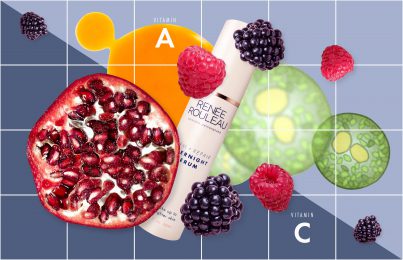Updated 02/15/22. You may have heard the term “oxidative stress” being thrown around in relation to skincare, but what does it really mean? To sum it up, oxidative stress is something that can harm your skin, leading to inflammation and the appearance of wrinkles and brown spots. An easy way to prevent oxidative stress is to use a vitamin C serum on your skin each and every morning. Keep reading to learn more about oxidative stress and see a vitamin C serum before and after that will prove it really works!
What Is Oxidative Stress?
First, let me give you a quick science lesson (I know all my readers are serious skincare enthusiasts and love to get all the details).
Most scientists agree that one of the primary reasons we age is because unstable electrons in molecules (called free radicals) attack healthy cells and change their composition. This then causes the cells to no longer function the way normal, younger cells do. This is called the Free Radical Theory of Aging, and it occurs 24 hours a day, 7 days a week.
Molecular biologists have identified three families of free radicals:
- Reactive Oxygen Species (ROS)
- Reactive Carbonyl Species (RCS)
- Reactive Nitrogen Species (RNS)
How Do Free Radicals Affect the Skin?
Not all free radicals are equal—some affect the skin more than others.
ROS
The most damaging of these three free radicals is the Reactive Oxygen Species (ROS). We are exposed to ROS from the air we breathe (oxygen), cigarette smoke, sunlight, stress, and smog. ROS causes oxidative stress by attacking all areas of cells, mutating DNA, and destroying the skin’s moisture barrier. ROS also damages the dermis layer of the skin, causes inflammation, and gives the skin wrinkles, brown spots, and a rough texture.
RCS
This is a carbon-based radical resulting from alcohol consumption and eating simple carbohydrates such as sugar, white flour, white rice, and pasta. RCS causes glycation, which is when a sugar-like coating forms over the skin’s proteins. This makes them hard and inflexible, resulting in loss of tone (sagging) as well as deep wrinkles and fine lines.
RNS
This type of free radical is nitrogen-based and is found mainly in the environment. Common sources are parks, woods, farmlands, and gardens. RNS is given off by nitrogen-rich soil, like fertilizers, car exhaust, and the “exhalations” made by trees. These change proteins in the skin, thereby increasing inflammation and triggering cell death.
While this all might sound dramatic and scary, I have some good news, too, so keep reading!
The Apple Experiment
Here’s a cool vitamin C serum before and after that demonstrates the benefits of antioxidants in skincare!
What I Used
All I used for this experiment was a single Gala apple, which is the kind I eat almost every night (an apple a day keeps the doctor away, right?), and the Vitamin C&E Treatment. It’s formulated with tetrahexyldecyl ascorbate and ascorbyl methylsilanol pectinate. Both are highly stable forms of vitamin C.
What I Did
All I did was cut out a piece of the apple and apply a thin coat of the vitamin C&E Treatment to half of it (I applied about the same amount I would apply to my face). Then, I waited for a little over an hour.
The Result
As you can see (and I promise there’s no fancy photo editing done here!), there is a significant difference between one side of the apple and the other. This shows how topical vitamin C can provide protection from free radicals and may interfere with natural oxidative processes. It demonstrates how vitamin C can slow the visible appearance of skin damage that occurs inside and out.
It’s important to note that you could get the same result from applying lemon juice to an apple. However, you would absolutely never, ever want to apply pure lemon juice to the skin, as it’s phototoxic and could severe dryness and irritation. Plus, pure lemon juice doesn’t have the advanced delivery system and stability of a well-formulated skincare product, so it wouldn’t give a preventative aging benefit anyways.
In conclusion, antioxidants have more scientific applications in skincare than most ingredient groups available. From barrier support to improved elasticity, prolonged cell longevity, and increased cell energy, antioxidants are truly one of the most beneficial skincare ingredients you can use. This is why I use so many of them in the products I formulate.
How Can I Prevent Free Radical Damage and Oxidative Stress in My Skin?
One of the very best ways to prevent oxidative stress and mitigate free radical activity is to apply skincare products that contain stable antioxidants to the face every morning. (I personally use the Vitamin C&E Treatment each and every morning). If you’re not using antioxidants under your daily sunscreen, it’s definitely time to start. It will help your skin age smartly.
Just like with the apple, a vitamin C serum can essentially keep your skin from turning brown (by preventing and fading brown spots due to its melanin-suppressing properties), as well as increase collagen, and make your skin look brighter, fresher, and more even-toned.
A Final Thought
Antioxidants such as vitamins C and E are incredible, but two alone can’t control the many forms of free radicals out there. The best strategy is to use a mix of antioxidants to neutralize as many free radicals as possible. An antioxidant product I suggest for nighttime use is the Firm + Repair Overnight Serum. It contains powerful superfruits and superfoods that can help manage oxidative stress.
Along with an antioxidant serum, you should definitely be using a well-formulated retinol product. Many people think retinol is a type of exfoliant, but did you know it’s technically an antioxidant? The more you know!
Next, learn about the importance of your skin’s pH level (and how you could be disrupting it).
Celebrity Esthetician & Skincare Expert
As an esthetician trained in cosmetic chemistry, Renée Rouleau has spent 30 years researching skin, educating her audience, and building an award-winning line of products. Her hands-on experience as an esthetician and trusted skin care expert has created a real-world solution — products that are formulated for nine different types of skin so your face will get exactly what it needs to look and feel its best. Trusted by celebrities, editors, bloggers, and skincare obsessives around the globe, her vast real-world knowledge and constant research are why Marie Claire calls her “the most passionate skin practitioner we know.”




Comments:
Hi,
I am still very confused if vitamin C becomes pro-oxidant on the skin? Please help.
Posted By: Olivia |
Additional question: I have also heard and read that Vitamin C serums can cause acne and breakouts- (I have acne prone skin) is there any truth to this?
Posted By: Olivia |
Not at all! We suggest all but the most severe grade acne sufferers use vitamin c in their routines.
Posted By: Ella Stevenson |
Vitamin C slows the oxidation process, making it a safe reliable antioxidant.
Posted By: Ella Stevenson |
Hi Renee, interesting post. I’ve heard a lot about vitamin C. Just wondering though, if the apple was prevented from going brown via vit C or merely because an occlusive layer was placed over it, thus preventing its contact with oxygen? And apples contain vitamin C haha, so I’m confused why they go brown so quick. What keeps the serum from oxidizing on the skin throughout the day (and thus causing more damage?) I’m wanting to invest in a good vitamin c serum and can’t decide on its efficacy as an antioxidant due to its instability, esp since once it’s applied to the skin, it basically is above 31 degrees, exposed to oxygen and water from humidity/moisturizer..
Posted By: Jackie duong |
Hi Jackie, great question! Vitamin C comes from many different sources in this formula. We use Tetrahexyldecyl Ascorbate, Kakadu Plum and Ascorbyl Methylsilanol Pectinate. Combined it gives the equivalent of 14% acid free vitamin C. In the case of Tetrahexyldecyl Ascorbate, it shows greater effectiveness in the skin than the standard unstable forms of L-ascorbic acid or ascorbic acid. We chose not to use the unstable forms of vitamin C due to their high oxidation rate as well as the irritating effects they can give to the skin.
Posted By: Renée Rouleau |
I am interested in the vitamin c serum and I have a credit Please get back to me on price of serum and my credit. Thanks. Myra Taylor
Posted By: Myra Taylor |
Hi Myra, Email customer service and they can assist you.
Posted By: Renée Rouleau |